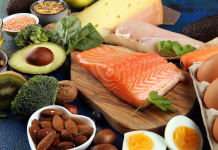When it comes to diet, we swallow a lot of advice. Food for Thought sorts through the latest science to create a new recipe for health.
Every day, it seems, we’re fed new advice about our diets. We’ve been told we can’t have bread, we shouldn’t eat eggs and to hold the butter. As The Diet Myth author Tim Spector notes, “So what is there left to eat? Maybe a bit of lettuce.”
At the same time, a whopping half of the calories we consume come from food that isn’t really food: it’s ultra-processed concoctions of starch, sugar, salt, hydrogenated oils, preservatives and additives. These foods are tasty and manufactured to make us crave them. But they’re killing us.
“Poor diet is the leading risk factor for death in Canada,” warns University of Montreal professor Jean-Claude Moubarac. “It’s a nutritional calamity.” His work suggests that only one in five Canadians cooks every day. Over the past several years, our appetite for convenience foods has skyrocketed — and so has the rate of obesity and diabetes.
MORE:
Food guru Tim Spector’s top ten tips for a healthier diet
Enter the calorimeter: a chamber that measures how many calories your body needs
Are you a supertaster? Here’s why you should know — and how to find out
It’s no wonder Moubarac and a growing group of scientists and dietitians are calling for a culinary coup. Their message? Stop obsessing over fats vs. carbs and counting calories. We should focus on what food actually is and how it’s made. As Health Canada prepares to release new national food guidelines in 2019, the message couldn’t be more timely.
“We definitely need a diet revolution,” says Melissa Baker, who oversees the nutrition plan for thousands of students at the University of British Columbia. She worries that an entire generation of young people raised on instant noodles, burgers and pizza remains blissfully unaware of how it will impact their health in the future. Those students, who are hungry for diet information, “get it from Dr. Google and are stressed whenever they put something in their mouths.”
To director Leora Eisen, making the documentary has been an eye-opening (and often mouth-watering) experience. “I have friends on low-fat diets and others on low-carb diets. Some have cut out gluten, some avoid fruit. There is so much confusing advice about what we should eat to stay healthy, it’s hard to know what’s based on accurate, fact-based research.” With a film crew in tow, she headed into the experts’ kitchens to see what they cook and eat themselves. “I wanted to know if they really follow the advice they’re giving the rest of us
The Nature of Things: Food for Thought takes us on a journey into the fascinating world of dietary science, revealing the answers to intriguing questions like: What’s in an apple? Why are supermarket tomatoes so tasteless? And just how fattening is that takeout you ordered last night?
From a street market in Brazil to a doughnut shop in Boston, a greenhouse in Florida to a campus kitchen in Vancouver, the film offers viewers plenty to chew on, including surprising research about the food we’ve been swallowing and a new recipe for healthier lives.
Try out some of the recipes from the doc: Tim Spector’s Lentils and Salmon, UBC’s Veggie Burger or Melissa Baker’s Glory Bowl.





























